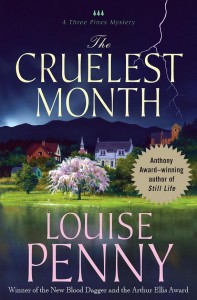Murder They Wrote – Louise Penny
- Share
- Tweet
- Pin
- Share
My last two columns have been devoted to two prolific, long-time authors, Laurie R. King and Archer Mayor. Between the two, they have published well over thirty books. This time, I’d like to introduce you to Louise Penny, the author of only three books (Still Life, A Fatal Grace and The Cruelest Month), but an author of incredible insight and impressive writing. She has quickly become one of the most highly awarded Canadian authors in recent memory. She’s won the Dagger, the Barry, the Anthony as well as Canada’s Arthur Ellis Award. In this time when crime fiction is becoming darker and more noir by the moment, Louise Penny offers a respite from the craziness and may well be ushering in a new wave of traditional village mysteries.
Fifteen years ago Louise Penny had it all. She was at the peak of her career with the Canadian Broadcasting Corporation. From Toronto, where she was born, to Thunder Bay, to Winnipeg, to the morning show in Quebec City, Penny had followed her dream to become a journalist and radio host specializing in hard news and current affairs.
When I interviewed Penny in 2006, her take on it was surprising. “I was 35 and looked around and thought ohmigod, I’m just really unhappy. I had everything, you know. I had the house; I had the great job; I had the trophy boyfriend. And yet, the better and shinier the veneer, the more miserable I was inside. And I think at some stage I just got so unhappy that even I couldn’t live the delusion any more. No amount of gummy bears or Agatha Christie would finally hide that…I would either do myself in (I could see that. It wasn’t imminent, but I could see that as an option because I couldn’t live with that kind of pain anymore.) or I had to change. And change at that time, that far into my life, was a very humbling experience.”
But change she did. And Still Life is one of the by-products of that change. A gentle, traditional mystery, Still Life is set in the small village of Three Pines, outside Montreal, near the US border. The apparently accidental death of one of the well-loved locals, Jane Neal, brings Chief Inspector Armand Gamache of the Sûreté du Québec and his team of investigators. But surprisingly, there is evil lying just below the surface. Jane, the quiet and private artist, has made someone very angry and now Miss Jane Neal is very dead.
Still Life is an intelligent novel of great depth. The characters are well defined and laced with emotion; the setting is spectacular and lovingly written; and the prose subtle yet somehow powerful, almost poetic at times. At its core, the book is about choice and change, people who make good or bad choices, people who are willing to change and those who are not. The maestro of this symphony is Armand Gamache, an insightful, perceptive man who in his mid-fifties is still surprised by violent death. A kind and quietly humorous man, it’s a pleasure to spend time with Gamache, but as he says himself, “Never confuse kindness with weakness.” Armand Gamache is definitely not weak.
Two books have now followed Still Life. All three are set in the village of Three Pines and feature the interesting and slightly offbeat occupants. A Fatal Grace takes place in the winter where a spectator at the annual Boxing Day curling match is fatally electrocuted. The frosty air, the comfort of a fire, and the chill of a murderer lurking are almost palpable. The Cruelest Month (scheduled for release in March, 2008) is set in the spring and this year, spring brings church services, egg hunts and séances. A group of friends attend a séance in a vacant house – a house that has seen murder before. And then one of the attendees dies of fright. Or so it appears…
As with Still Life, the settings are almost mystical, the small village removed from the rest of the world. The characters, however, are anything but. Each book is infused with the quiet spirit of Armand Gamache and the supporting characters are clever, funny, and kind-hearted…and sometimes cruel. They are folks just like us with hopes and dreams and disappointments. They have flaws and that’s what makes them so very real. There’s a wonderful quote in A Fatal Grace from Leonard Cohen’s “Anthem.”
Forget your perfect offering,
There’s a crack in everything,
That’s how the light gets in.
And now, midst the dark and stormy night, Louise Penny lets in the light.
Visit your local library or independent bookseller and enjoy the mystery…


